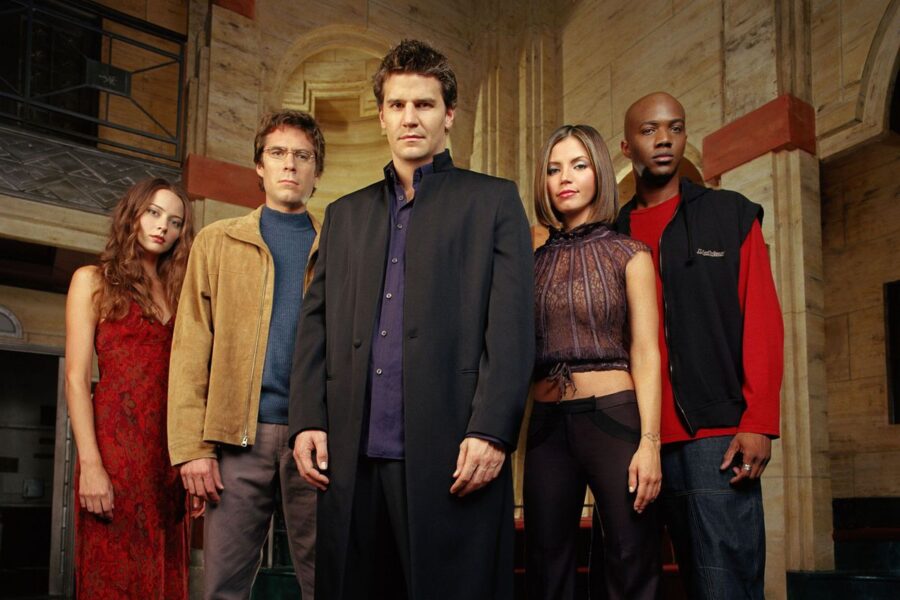Angel Did One Thing Better Than Buffy The Vampire Slayer
The one thing that Angel did better than Buffy the Vampire Slayer was create a better development arc for its characters.

It’s been 20 years since we saw Buffy Summers and the Scooby Gang (or what was left of them, anyway) drive away from the giant hole in the earth that used to be Sunnydale in a big yellow school bus and one of the most culturally impactful television shows of all time came to an end. After seven years on the air, Joss Whedon’s Buffy the Vampire Slayer starring Sarah Michelle Gellar, became an instant classic, famed for its quippy dialog and use of monsters as a metaphor for growing up. Still, there is one thing that the series’ spin-off show, Angel, did even better than Buffy, and that was adult character development.
Even though Angel was a spin-off of Buffy, the two shows couldn’t have had a more different tone. Buffy, though it dealt with difficult themes like death, sexuality, and betrayal, was a much lighter show, indicating its connection to childhood, even as the characters grew into young adults, something that was reflected even in the art design for the series, which often used bright fabrics from Buffy and Willow’s wardrobes and lit the scenes with sunny California daylight. Angel, on the other hand, took place almost exclusively at night and though it dealt with a lot of the same themes, took on a much more cynical approach (with film noir motifs and anti-hero angles) that rapidly aged its characters.

The primary Angel characters, Angel, Wesley, and Cordelia, were all introduced in Buffy first and are roughly the same age as the Scooby Gang (except for Angel, who is about 250 years older), though you wouldn’t realize it when looking at the two shows separately. In Buffy Season 4, the Scooby Gang transitions from high school to college and deals with the growing pains of becoming young adults. Meanwhile, in Angel Season 1, Cordelia and Wesley are thrust into gritty Los Angeles and immediately faced with the challenges of surviving in the grown-up world—earning a paycheck, dealing with real-world enemies (not just demons and monsters), and dating as adults.
As Angel and Buffy progress, Buffy and the gang continue fighting monsters as always, learning and growing along the way but overall staying fairly similar to the people they were when the show began. It’s a coming-of-age show, which means that, until the very last episode, Buffy still needs to be in that transitionary period. Meanwhile, Angel is about what happens after the growing up rite of passage is over, and how these characters will continue to grow as adults as they are faced with more dire situations and deal with the moral ambiguity of life.
Although Cordelia Chase was only 18 when Angel Season 1 began, she is treated like she is in her late 20s or early 30s, much closer to the age of Charisma Carpenter, who played her. While Cordy was the popular mean girl in high school, her character has to quickly grow up after her parents are sent to prison (off-screen), and she is suddenly left to fend for herself. We watch Cordelia rapidly age from a spoiled brat to a warrior woman before she is wiped out by Jasmine in Season 4 (though we wish that entire storyline was wiped out instead).

Wesley Wyndam-Pryce also sees major quick growth in Angel after he leaves Buffy. He transforms from a pompous 22-year-old fresh out of the Watcher’s School who can barely wield a weapon into a motorcycle-riding rogue demon hunter and then into an extremely capable warrior and wizard in Angel’s final season, hardened by the traumas he has faced over the past five years.
While at the end of Buffy Season 7, Angel listens to Buffy rant about being “cookie dough,” a metaphor the slayer uses to describe how she is still waiting to see who she will become, the entire cast of Angel has gone through major character development, faced pitfalls and redemption arcs, and transformed completely from the characters they were introduced as at the beginning of the series.












